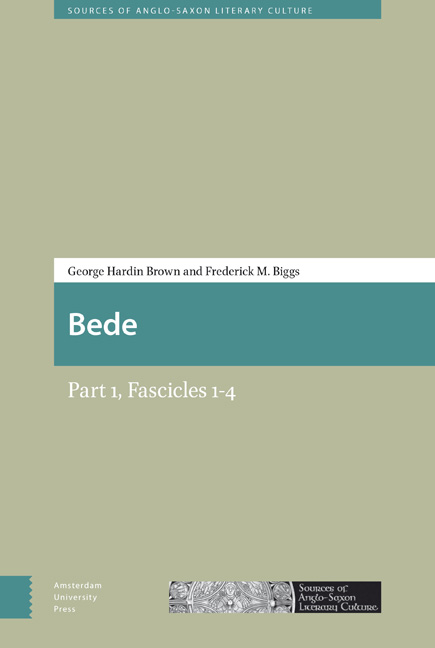Introduction
Published online by Cambridge University Press: 02 February 2021
Summary
In any account of the literary culture of Anglo-Saxon England, Bede must loom large. While only one of many distinctive voices for whom we have a written record, Bede stands out as the author who turned a lifetime of study into the widest-ranging corpus of writings, many of which continued to influence later generations. THEODORE, archbishop of Canterbury, and HADRIAN, abbot of St Peter's Canterbury, may have been better educated and more able teachers. ALDHELM, the BEOWULF-poet, and, to choose one more example from among many, CYNEWULFmay have written better verse. BONIFACE, archbishop and martyr, may have changed more lives through his mission. ALCUIN, abbot of Tours, may have carried English scholarship more effectively to the Continent. ALFRED THE GREAT's support of education may have occurred at a more crucial moment in English history. DUNSTAN, archbishop of Canterbury, ÆTHELWOLD, bishop of Winchester, and Oswald, bishop of Worcester and archbishop of York, may have instituted a more significant reform. ÆLFRIC, abbot of Eynsham, and WULFSTAN, archbishop of York, may have preached better sermons. Bede, however, left writings that demonstrate his skills and influence in all these areas, writings that those who followed him would have almost certainly known, as these entries and the ones that will complete this survey in the next volume of SASLC show.
Evaluating Bede's place in this literary culture is sometimes complicated because, as these works demonstrate, his own reading, which was both wide and deep, appears often in his writing. When in the well-known autobiographical passage at the end of the HISTORIA ECCLESIASTICA GENTIS ANGLORUM(V.xxiv) he spoke of having been sent at the age of seven by his kinsmen to enter the monastery of Monkwearmouth, it was not in order for him to become a monk, although this was their intention, but specifically for him to be educated: “cum essem annorum VII, cura propinquorum datus sum educandus reuerentissimo abbati Benedicto, ac deinde Ceolfrido” (ed. Lapidge 2010 2.480; “when I was seven years of age I was, by the care of my kinsmen, put into the charge of the reverend Abbot Benedict and then of CEOLFRITHto be educated,” trans. Colgrave and Mynors 1969 p 567).
- Type
- Chapter
- Information
- BedePart 1, Fascicles 1-4, pp. 17 - 38Publisher: Amsterdam University PressPrint publication year: 2017



